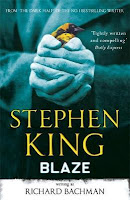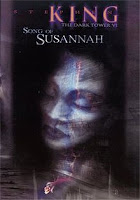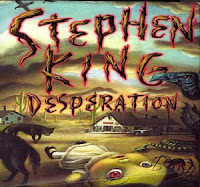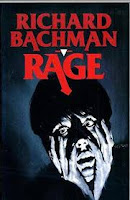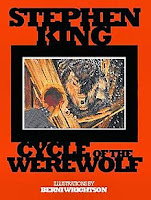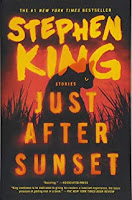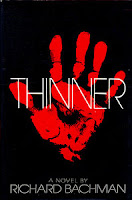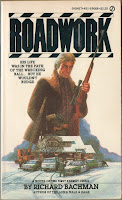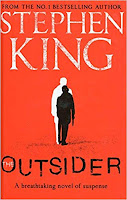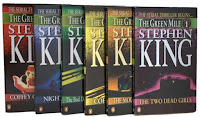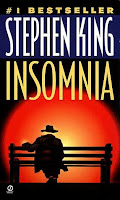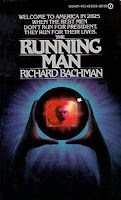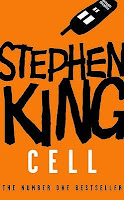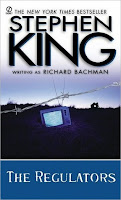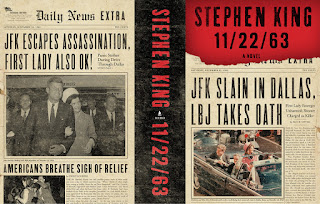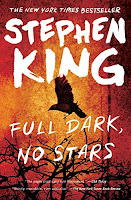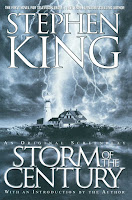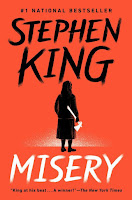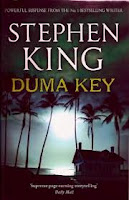I re-did these in 2016, but there've been a few books to have come out since then. Plus, I've been mentally re-shuffling, as happens as new context emerges or rereads happen or initial impressions are tempered by other things.
Like the 2016 re-rankings, I decided to be sparing with links. (Exceptions made for recently-covered material like any of the Dark Tower books.) Unlike the 2016 rankings, I included the short story and novellas collections in the mix. Not included: all collaborations (The Talisman, Black House, Gwendy's Button Box, Sleeping Beauties, Hearts in Suspension - this is also convenient as I've still yet to read any of those) and Lisey's Story (same). I always separate non-fiction from fiction and do so again here, although for non-fiction, the list is easy: (5) Any of the e-pamphlets (Guns, King Yells at Trump Voters, etc.), (4) Nightmares in the Sky (cool pictures), (3) Danse Macabre (quite good and will leave you with years of stuff to read and watch), (2) Faithful (sure it's a collaboration, with Stewart O'Nan, but also indispensable for the Red Sox fan), and (1) On Writing (indispensable for everyone).
I decided not to quote myself, except in a couple of cases. I'm sure I repeat myself plenty. Some things I just don't have any new thoughts on. (For ranking the various King-based miniseries, see here. For the movies, click here.)
Only thing left is to do the damn thing. Here we go.
65.
Is this really King's worst book? Nah. I'm not even sure it's my least favorite. I don't like it much, and I read it two and a half times to be sure. I think Brady's just not a very interesting character; King's scraped the bottom of this particular bowl too many times. Jerome, too. King's fascination with Holly Gibney is puzzling. This character (the slightly autistic savant who comes out of her shell as mentored by older detective) exists in at least 4000 other books, movies, and series, but King treats her as if she's some recently discovered species. None of these things sink the book all on their own, but it's all just a big puddle of blah for me.
64.
This one's probably worse than Mr. Mercedes, as the concluding volume of a trilogy shoulders the responsibility of ending it properly. And this doesn't. But if "well begun is half done" (as a certain Mr. Cressner believes) then the opposite was true here: End of Watch had that working against it.
Some of the bits on Brady's burgeoning super-powers are compelling stretches of reading, but we've seen this stuff (and better and maybe even too much of it) elsewhere.
The assault on the house at the end reminded me a little of The Osterman Weekend. I haven't seen this suggested anywhere else, but some of the cross-cutting/ set-up/ balaclavas/ Swedish guns, maybe. (Sidenote: I might not even be thinking of The Osterman Weekend.)
63.
It's tough to tell what the point of writing an unsolvable mystery is outside of a classroom exercise of some kind. King's at a point, both careerwise and talentwise, where he can write such a thing and get it published and even make it compelling. But why would he want to? And how could anyone tell if he succeeded or not? He famously derided Nicholson Baker's Vox as a meaningless fingernail paring, but what is this, then?
I can only assume there's something here I'm missing. Perhaps there is an answer - there's some interesting ideas over here - but it feels like a cheat. For the time being, here's where it falls.
62.
Plenty of people I know love this one. I tried reading it again not so long ago and just couldn't get into it. The Red Razberry Zingers motif is dumb, and the writing just seems out of focus to me. When I read that King doesn't remember writing this one, it made sense; it's a rushed, sloppy affair. But everyone I know thinks it's great, so I must be missing something. Maybe the next re-rankings will see a bump up.
As a dark side of Jack London tale - and any book that entertains the rabid dog's POV, multiple times, rubs noses with that tradition - it needed more time in the oven.
61.
I was pretty underwhelmed by this one, as well. The last five pages or so are pretty good. The cover is great - look at that up there! Alas, its subject (Rose the Hat) and her malevolent band of geezers are not well-realized King creations for my money. Nor is Abra Stone, the (unlikely) granddaughter of Jack Torrance. As a sequel to one of my favorite King books, it's disappointing.
King has revisited the Shining well a few times since the original came out. He didn't seem too into the opera, which for my money was the best of any adaptation outside Kubrick's. It seems like the more he tries to re-assert authorship - something of course he doesn't have to do, since the original is still right there, kicking ass still some forty-odd years after its release - he misses a step.
God I wish Kubrick was around to make a movie of it and kick off a new vendetta. I would totally pull a Cosmic Cube/ Thanos-finger-snap to watch that play out.
The next time I re-do these rankings, there'll be a Mike Flanagan adaptation to talk about. Looking forward to that; he does great work.
60.
I kind of forget this one. I remember thinking it was perfectly fine when I read it, just it felt like what King introduced it as: a trunk novel. It's difficult to imagine anyone out there who has this as his or her number one. (I'm sorry, as Bachman's number one.)
59.
Is it a cheat including this one? It's unfinished and never got a proper release. And I like parts of it fine. If he ever finishes it (doubtful) I'll re-evaluate. The mad General's "HA!" diary entries are ridiculous; I have no idea why King gets such a pass for how unrealistic and same-sounding all of his epistolary stuff can be.
58.
Recently covered here.
57.
Recently covered here.
56.
Recently covered here. This is where the series goes fatally tits-up for me. The Dark Tower didn't start out as a story where Stephen King writing it was part of the deal. I can't absolutely say that's the case, of course. (Cut to Steve King circa 1970: "And then I'm going to show up in book 6 - fuck you, I'm serious! Tak-a-la!") But it deprives the story of something essential for me - some sense of disbelief or distance. It turns the whole thing into an exploration of King's various modus operandi. Interesting - very in some places - but not the story that I was vested in from book one.
I seem to be in a minority on this - and most other damn topics I guess - in the King online community.
55.
Some people really love this one. I freely admit: had I read this one before I read Duma Key, perhaps I'd have enjoyed it more. But, I didn't. It just seems like a bunch of King leftovers put together in an unremarkable casserole. Its Dark Tower tie-ins seem perfunctory, and the I-guy narrator and "let me help out murkily and incompletely even though the powers and insight displayed would not prevent me from being more direct" ghost/ dream plot-assists are unpersuasive.
54.
Really, this could be my least favorite King. It starts off great and then sticks around for way too long, going round and round. To dig himself out, King goes to some religious cosmological stuff that never really transcends hazy platitudes. Oddly enough this was the main appeal of the novel when I first read it, but further reflection changed my mind. Not on account of disagreement, just that I don't think he makes his case well enough.
Some great potential in the sheriff-possessed-by-demon concept, some nice scenery, that's about it. That some people actually prefer this to The Regulators blows my mind.
53.
The hazy religious platitudes are still hazy but handled much better in this one. If I had to nominate a book that puts across a sensible religious "worldview", so to speak, it might be this one. (Or #25.) It might even be the most underrated writing of King's whole career.
Why then do I never want to reread it? This book has some kind of anti-reread spell cast over it. I've watched it drop steadily since my first rankings. I'd hate to see it drop any further, but I have to admit to myself: reading it once really was enough for me. That's a rare quality for a King book with me, where 2 or 3 reads of the same book is not uncommon.
52.
A lot of people have this one as their least favorite King. It gets insane, no doubt, and as is the case wherever King introduces it, the telepathy seeps into every corner of the book and it all becomes kind of a mess. But what can I say? I like the setting, and I like the characters. The alien invasion kind of peters out into a beat-the-clock cross-cutting scenario with an antagonist who thinks/ acts like too many other King antagonists (despite being from outer space), and that's what ultimately sinks it, not the shit weasels and not "I Duddits!" (Even though "I Duddits!" is pretty dumb. All the more because it brings to mind I, Claudius which is about a thousand miles away conceptually and tonally from Donnie Wahlberg. Someone really should've done a mash-up of the two for SNL or something at the time of the movie's release.)
Not that King had Donnie Wahlberg in mind when he wrote it. By all accounts, he wrote this in a fever-dream of agony and sweat. That's another thing I kind of like about it. I kind of cheer King on while reading it. "Okay, this part is crazy, but keep on chugging, big guy. Constant Reader's with you." (My reward? Being told I'm an idiot over and over again. Life is great.)
All that aside, though, no doubt this one's a miss. Of course, it's Ivanhoe compared to the film adaptation. Which has to be some kind of squandered-talent-demolition-derby all time champion.
51.
This one is uncomfortably getting both more and less interesting to me as time goes on. Like the real world scenarios playing out every so often in another heartbreaking cycle of news, the answers given bring little understanding or preventive medicine. Unlike them, at least it's a work of fiction that plays within certain rules and boundaries which allows a certain meditation on the events in play that the news does not. Whether that's a merciful thing, though, I don't know. One of these days I'm due for a reread.
50.
I'm going to reverse course and quote myself, this from a comment I left on The Truth Inside the Lie's review of the book:
"Things I liked: the characters, the setting, the introduction of the conflicts and the set-up, the Turkey Trot, most of the actual writing/ description of the ending ascent into the heavens.
Things I not-so-much-ed: The two plots (the unresolvable problem, namely dying, as represented by the unstoppable weight loss, and the conflict between Deirdre and Missy and the town) didn't quite come together enough to wow me with the end. That said, I didn't dislike it. I felt like it built towards something and then just kind of, well, drifted into the clouds. Inoffensively enough. I think it needed an act between the last and the dinner party. Something there, don't know. Maybe Wild Billy could have shown up and kicked out a couple of windows before subdued by psionics, I don't know. "
Bryant's reply cracked me up: "I'm hard-pressed to think of a book that wouldn't improve." He's not wrong.
49.
This one rose quite a bit as a result of my reading it one segment at a time on the first of every month last year. That was the plan at least - it turned out more like I kept to that schedule for January and February of 2018 and then read the rest of it in November and December. Nevertheless, it was the first time I enjoyed reading it. It's still fairly slight and feels kind of like auto-pilot, but it's satisfying.
Of all the King projects getting TV series, someone should really pick this one up. You could film every word verbatim and have enough room to add a hundred different things without contradicting any of it. Do it right and augment the existing material and you could even get five seasons out of it. Why has this not occurred to someone?
48.
It's really not one of my favorite King books, but there's a sense of authentic menace to this one that I tip my cap to. It's one of the entries on my own list of Books About High School.
47.
I guess this one should be such an entry as well. Except I never actually read it while in high school. Saw the movie plenty of times but only read it for the first time a few years back.
I suspect that this one fits into "70s Books" much better than most give it credit for. Some of the Bachman ones, too, written in the 70s but technically published in the 80s. Carrie is as much a part of the 70s - and not just the DePalma movie - as Jaws or Looking for Mister Goodbar. These distinctions might not mean much to future generations - or even current ones - but I can only speak from my own view on the Ferris wheel.
46.
My last re-read on this was harsher than expected. Again, it's tough to appreciate anew certain aspects of the worldbuilding in the first few Dark Tower books since everything is up-ended by the meta in later books. It's a bit like the last few seasons of The Office in that regard, where mistakes made at the end in tone, consistency, and internal logic retcon even the formerly-unassailable delights of the first few seasons. But the comparison isn't perfect; there's no Replace-Michael-Scott problem in the Dark Tower. (Thankfully - my guess is Eddie Dean would have turned into Andy Bernard.)
I didn't realize when I started this comparison that there's an Idris-Elba-bridge between the two. I swear I didn't do that on purpose. Forgive this awkward disclaimer.
45.
I enjoyed this on my last read, but there's not much to this one, is there? In retrospect it seems just part of a late-80s attempt by King to re-brand/ diversify the portfolio. (A successful one.)
44.
My thoughts are unchanged since 2016 on this one. "I still find it a very enjoyable read, but upon re-examination, I found myself agreeing with this Goodreads review:
'King spends a great deal of this book explaining to the reader that there's not always a definitive ending. Listen, friends and neighbors, I can get behind a short story or a novella that leaves me with an unsatisfactory ending because they aren't time sinks. To be in the audience of a magic show wherein the magic is only alluded to is a terrible trick. I don't need everything explained. I don't need my hand held. But I want a complete story. This is not a complete story. (...) The shifts in tone are jarring. You never know what kind of book you're reading. The characters are taken part and parcel from The Green Mile. If you've read both books, you'll probably see where I'm coming from. I mean even down to the wild fucker named Billy. Billy the Kid... Billy Lippin. And Sandy Dearborn and Paul Edgecomb are the same person. I don't care what their names are. Sweet baby Tom Cruise, the parallels are so obvious...'
(That) didn't occur to me at all while reading. Now I can't un-see it, though. Mostly * the reviewer is right - it's kind of silly to write a book-length Shaggy Dog story about the dubious point of Shaggy Dog stories. I get that the whole thing is a metaphor of life and death and the mystery of both, that the anger that Sandy feels towards Ned for his impatience and youth is fear of the unknown and deep primal urges to eat our young. (Wait, what?) But perhaps these are truths that don't fit so snugly in the not-quite-car of the title. That said, I find the evocation of the barracks and the mystery of the car in Shed B very enjoyable reading."
* Likening it to a magic show where the magic is only alluded to is not quite accurate; it's more than alluded to. The magician just doesn't explain his trick. That seems important enough of a difference to underscore.
43.
This one's fun enough. Certainly readable enough. It would've made a better X-Men limited series had that been an option. (What a coup that'd have been for Shooter's Marvel years.) Hindsight and all, more's the pity. That cover is perfect for an iconic 80s Marvel memory that never was.
Those fans of King's adverbs instruction (namely: don't use them) in On Writing will find plenty of opportunities for red-circling in this book.
42.
I agree with most King readers that it'd have been better served as a standalone affair. Everything about Morris Bellamy, John Rothstein, and Peter Saubers interested me; everything else seemed shoehorned into the Hodges-verse.
Speaking of, does anyone reference the novels of John Rothstein in The Outsider? Or the band playing at the end of Mr. Mercedes? Was it One Direction or an invented band? (Nope, it's "'Round Here." Truth Inside the Lie to the rescue! You'd be surprised how much time I wasted googling this with no success. Ye "Totally-Comprehensive-King-Overview" bloggers out there that were returned in my google results: this is the kind of advertised-but-missing detail that makes me reluctant to revisit your blog.)
41.
I love that cover. Most of these stories are B-material, even the ones I love ("Home Delivery," "Chattery Teeth," "Rainy Season"). "The Night Flier" is pretty cool, too. I'll be blogging this one up soon and don't want to say too much. Here's where it falls for me on my overall enjoyment scale.
40.
 |
| Gerald's Game (1992) |
Most of this book is great. Top 30 material, maybe even top 20. But I just don't like the epilogue. I like the idea of an epilogue with a twist, just not this one. It really brings down the overall score for me.
39.
I always feel bad about this one. It's just that I saw the movie so many times before I read it, and the movie is one of my favorites. Not just for King but all around. I enjoy stretches of the book, but it doesn't have the emotional resonance with me that the film does. And I'm sure it's there, it's just one of those cases where the movie got there first and I can't shake its approach vs. the one in the text. There's plenty of King I watched before I ever read (Salem's Lot, The Shining, Carrie, Christine, and The Green Mile, to name just to name a few) and I feel reasonably confident I'm able to compartmentalize those experiences. But I can't seem to do that with The Dead Zone. This is my problem, not the book's.
38.
I'm making my way through King's short fiction again, and perhaps a revisit will bump this one up, I don't know. It's not my favorite collection of King's stories. I like "Mute" or "N" the best. "Willa" is a nice entry in the (rather sweet) "I sure love my wife" side of King's biblio.
Incidentally, in the intro to Nightmares and Dreamscapes King mentions how he didn't plan on including anything he published in his earlier career in any future short story collections. Is "The Cat From Hell" (first published 1977) the only exception?
37.
I think this one might be a stronger novel than a lot of people give it credit for, and I suspect a reread might bump this one up. I keep meaning to do that. Ditto for:
36.
I know a lot of people dislike this one or think it's a misfire. It very well may be. If memory serves, I was with it until the Indigo Girls fundraiser and then it went into some kind of King cruise control that tempered my enthusiasm. (I did think the epilogue was great, though.)
It amuses me that it's the Indigo Girls, and that King has so many stories where an attack at a concert/ fundraiser is a prominent plot point. I do not mean this in a superior way one iota - my amusement comes from the same place as my awe at his other powers of storytelling. He really goes for something here, and that's true of every book he wrote in the 90s. This is one where I think he gets close enough - in spots - to be considered mostly a success.
I keep meaning to do a blog of King's Villains. Every time I start, I realize how much work such a thing entials, since there are multiple villains per book, and some judgment calls to be made to boot about who is or is not an actual antagonist. Too much work! If I ever do, though, I imagine Norman Daniels will be down there with Henry Bowers and Brady Hartsfield.
35.
I started this one when I was in St. Louis last month, the same trip I listened to The Outsider on audiobook, This one I read in little bits here and there at the hotel and while eating All-American Scramblers at the Dennys next to the hotel. None of the scramblers were enjoyable, but I kept going back. I kept thinking they can't screw this up again, but then they screwed it up again. That isn't some kind of metaphor for Skeleton Crew, though; there's a hell of a lot of enjoyable writing here.
Scramblers aside, it was fun to revisit this one in places I'd never been before. Like Night Shift, I read it in many a study hall back in high school.
34.
I don't think this is a perfect book, but (like Carrie) it's a great 70s book. King was very American New Wave here, and it's unfortunate those early Bachman books (or hell, all of them) couldn't be ANW features. Wouldn't it be something to peek into that timeline where Scorsese, Bogdonavich, Cimino, Schrader, and all the rest adapted all of Bachman's novels. (A tough feat considering they hadn't really been published to fit the ANW time frame, but since we're Ur-kindling, it shouldn't matter.)
33.
We're entering territory where I will try to avoid affixing "but I love it anyway" to anything critical I say. But, I do love pretty much love everything here on out. Let's reflect on that a minute. That's 34 books I love by one author. Crazy. Most authors don't even publish 34 books, much less 34 ones I love. There's a reason I strenuously avoid any exposure to The Crimson Twitter King; there's a very real stake involved for me.34 books I love are in the balance! It's not a fun problem to manage.
Anyway, all of these could be a little shorter, but they're each memorable in their own way. I'm a "Sun Dog" apologist, especially the further and further we get away from developed film. It's not perfect, and it goes on too long, and the very very ending's kind of lame, and Pops Merrill is not as fun to read as he was to write (probably) for King. And yet, it speaks to me.
32.
This one falters once the kid with telepathy shows up and then the big-ass storm setpiece, but the rest of it is strong. I have neither high nor low hopes for the forthcoming TV adaptation, but sooner or later, someone could make a pretty great movie out of this. I guess you could say that for just about any King, but this one seems well-suited for the screen. It'd be a good vehicle to launch a few careers.
31.
As would this, I guess, although given the age of the main characters, some seasoned vets would likely land the roles. Casting suggestions welcome. I'm still pretty positive on this one. Nothing new, but the old rites performed by those who know how to perform them are often better than those whose only virtue is being new.
I've been reflecting on some of the comments from my post on this one, about the potential of its being a political metaphor. If King was crafting an Under the Dome-like metaphor for the past few years of our political landscape - and I think it's possible he may have been - then it's a subtle and appreciably non-alienating one. I mean, I like a good political satire as much as anyone, regardless of my feelings of what's being satirized; I just object to banality/ unexamined-Pavlonian-responses. I don't see either of those in play here, personally.
Either way it shouldn't matter; it's a satisfying blend of action, mystery, and pace. And I even liked Holly Gibney. If you liked Salem's Lot, there's no reason you shouldn't like The Outsider, too.
30.
This one has got some of my favorite short fiction works by King ("Lunch at the Gotham Cafe" and "Little Sisters of Eluria"). If Nightmares and Dreamscapes is a B-sides album, this is an A-sides compilation.
29.
A pretty wild escalation of Roland's affairs. Recently reviewed here.
28.
It's showing up here in the top 30 mainly on account of "Ur," which I still really love. I really like a lot of them - I'll be getting to my re-read post on that soon enough so I'll shut up for now.
27.
I've re-read the 2 novellas and handful of stories that comprise this volume 3 or 4 times now. Each time, the novellas seem stronger, but the stories feel like they need something more. There's not enough reflective material here to justify the grouping. And yet, there is. It's a very weird book.
My official take would be it's an uneven collection of works, revolving around too murky a theme, that avoids a conclusion. Which seems to have been the intent, but it's not an intent anyone can really judge, is it? Also, Carol as some kind of Weathermen-fantasy is just dumb. Baby boomer vanities annoy me more with each passing year; the reality of such activism is Hanoi Jane, the Manson Girls, and the SLA. And lots of gonorrhea. But such irritations aside, the way things wrap up (or don't wrap up) dropped this one steadily on each reread.
I still think each of the 2 novellas is an A+, though.
26.
Like the above, this one a) fell a bit on subsequent rereads and b) I still think is pretty great. I've just a little fatigue with some of the themes and devices used here. If this was the only King you ever read, you'd never notice such a thing, but if it's part of a frequent round of re-reads, you start to notice some things that he kinda does all the time. Hardly a unique insight and not really a damning one. Just explaining how it ended up here when it was once all the way up ahead of The Stand in my personal countdown.
25.
I loved this one when I first read it, cooled a little upon reflection, then loved it a little less on a re-read, then warmed up again upon further reflection. Who knows where it'll end up next time - watch this space for all the exciting developments!
There's something to be said for any horror author of King's stature - though has there been any other of King's stature? - ticking off all the boxes on the horror-genre cheat-sheet: Dracula, check, Wolfman, check, Haunted House, check, etc. As his Frankenstein(check) book, I think this is a pretty solid angle of approach.
The "fifth business" motif, though, is annoying. If I may speculate, King seizes upon such things to get (and keep) himself going when writing something new. Problem is, he leaves them in when editing the first draft. So you end up with "bool"s and "fifth business"es and teen sewer gangbangs. (Scratch that last one, perhaps.) Do whatever you got to do to get to the finish line, sure, but ponder a little during editing: does this make sense? Is this too personalized to me? Would this annoy Bryan McMillan?
I mean, when he invents his own term for something, like "Alice" for an off-season hurricane in Florida, okay fine; when he invents a process that no one has heard of, though, it's a layer of artifice too many. (Again, see "Would This Annoy Bryan McMillan?" in Pertinent Questions for the Author During the Rewrite Process, vol. ongoing.)
24.
I remember 3 things about this novel. (1) I loved all the 3 Fates and deck of cards stuff and the idea that if you're tortured by insomnia enough, you are gifted this glimpse of the supernatural underpinnings of reality. (2) I'd been warned off the book due to its political material, presumably because I am to the right of Adlai Stephenson (on most things) but to the left of Harry S. Truman (on some things). (And no I do not have any less dated references.) But I wasn't alienated by it; not sure who would be, really, except an extremist on either side of the abortion debate. And why let extremists drive the bus? They drive those things in one direction: into crowds or shopping centers with explosives in the back. And (3) I cried at the end.
Well, I guess (4) I remember the weird Darby o'Gill/ Wizard of Oz type scene with the Crimson King, and (5) The idea that a pro-abortion activist could sell out a convention center or be that magnificent a public figure for Derry and environs struck me as fairly unrealistic. It strikes me as less so in 2019, and that's too bad.
I look forward to reading this one again someday.
23.
A unique and enjoyably askew contribution to the genre. Recently reviewed here.
22.
A solid double if not triple. King's down-home voice and persona come across very well. Which is to say he restrains himself. This reads like a book that was well-edited. I'd be curious if there's any truth to that - probably not, but it reads that way to me.
It seems that the movie has more longevity in people's memories than the novel. (With the opera a distant third.) In a way that's good, as the film is pretty damn good and an effective adaptation of the book. I wonder if this will gradually become known as King's finest work? I don't think it is, although you can see it is my 22nd favorite, but if it gained that reputation - even if it was only at the behest of those who would evaluate King's work solely re: the gender of the protagonist and political nature of her struggle - I wouldn't argue. It's a great book, whatever road you take to get there.
21.
This one probably is not. I don't know why I love this one so much, but I really do. It's ridiculous. It's just kind of a perfect paperback. "Dashed off" in a couple of days, but it's a lean and kinetic slice of 70s dystopia. Just like the other Bachmans, but more successfully. Well except for #18.
20.
Love 80% of it. Maybe 85%. See here for fairly recent thoughts.
19.
The Truth Inside the Lie reviewed the hell out of this book (and film) and you should go over there and check it all out. These reviews turned me around completely on this work, which prior to them I'd felt was a bit of a miss. I keep bugging the missus to watch this one again. And myself to read it again.
A fairly important book in King's auto-bibliography.
18.
I made my way through the Derry Public Radio's discussion of this. It was interesting to hear a younger generation's take on material that relies a lot on Vietnam-era context. They didn't really connect with the material as deeply as I felt they might have. Possibly on account of this? Who knows. Why am I bringing this up? Because I wonder if this is going to be one - perhaps all the Bachmans - that will fail to connect with anyone born after 1988 or so.
I mean, I'm 45 in just under a month; I'm definitely in the "what the hell are the kids talking about now?" stage of life. But it seems there's a lot of relevant metaphors for life, work, and society in The Long Walk that would be helpful for any generation, but perhaps even especially the newer one(s). I think of Rushmore or Lord of the Flies or Heathers, each expressing their own set of adolescent truisms despite inter-generational differences. But do these things just fail to connect with the youth of today? Lord I hope not. Anyway: prior to listening to this podcast I figured if anything The Long Walk would be even more popular with the youth of today, not less.
17.
Like The Green Mile, a certain amount of King-fatigue has dropped this one down a little. There's little here that you haven't read in "The Mist" or something, except there's telepathy here and not in "the Mist". You'd think that would be a demerit, but the whole hivemind-telepathy angle, here, and believing false-narratives/imagery so strongly that you kill yourself, adds to the horror. Particularly because it DOES seem to be some kind of side effect of cellphone/ social media technology, spreading from just answering the phone or scrolling through the apps on it.
This was by no means apparent when King wrote it, but he was certainly spot-on in seeing it coming. And I wish he hadn't been. Let's hope he hasn't irreparably "answered the call" himself.
16
I'm probably overranking this book, but it just feels like this big thing he did that maybe should be recognized more. I can't believe they made that crap TV show out of it instead of something awesome. A great example of letting demographic-second-guessing drive the bus off a cliff instead of just filming what the man wrote.
I've referred to this as a great satire of the Bush/ Cheney years, and I probably still think that, but for the record, snarkiness aside, it's a fairly poor metaphor for those years. If you watched nothing but The Daily Show or read nothing but Rolling Stone during them, though, you might feel differently. (And that describes me to a T during those years, pretty much) But, Under the Dome is also a great metaphor for the media covering (like a dome!) the Bush/ Cheney years and how it felt to be on either side of the glass. Like Colbert famously said on the first episode of The Colbert Report: "We're here to feel the news at you."
As such, Under the Dome really lands. I think it's a great read and lots of fun and very satisfying.
As has been remarked upon elsewhere and at length, maybe a few hundred too many "Baaaaaaaaaarbie"s, though. I can't believe I listened to something like 17 discs of the audiobook before switching over to the book. Mostly I can't believe I had that kind of time once! And/or the ability to listen to things while doing other things without constant interruption. Under the dome, indeed.
15.
Reviewed fairly recently here. Intro to King 101. EC / Creepy moves to your Book Club.
Somewhere out there there's a King fan who's only ever seen Creepshow and Cat's Eye and only ever read Skeleton Crew and Night Shift. Man do I want to interview that person.
14.
I feel I have to repeat myself here, if only to make sense of why it's not in my top 5, like everyone else I know:
"King threw open the windows and wanted to make a book about everything: racism! nostalgia! childhood! imagination! more racism! sizeism! cosmic balance! the 50s! the 80s! riddles! cocaine! booze! writing fame! show biz! more coke! God! Anti-God! history! Bangor! America! the twentieth century! incest! bullying! child abuse! teenage reacharounds! hoboes! you name it. It almost never works to mash down every button on the board. That It actually almost pulls it off FFS is nothing short of amazing. But: it doesn't. It can't. (That so many think it does work is evidence of how well-written so much of it is.)
So, here it is at #17. * Truthfully, any book that sticks the landing the way this one does, after 1000 pages, deserves to be punted even further down the line. Except well, like everyone else, the parts of It that work for me really really work, and I still kind of love it. "
* Number 14 this year! Keep climbing that ladder, Stuttering Bill.
13.
What a kick-ass collection this is. Originally I had this up at #8. Mainly because I love the damn cover so much. (I kid. I mean, it is an awesome cover, but the novellas are all great, too.) But I did a quick pound-for-pound comparison of what ended up at #8 and whaddya' know, had to swap them. "The Breathing Method" is my current favorite of this collection, although how can you go wrong with any of the others? "Apt Pupil" will always remain the creepiest thing I read in high school.
I have fond memories of reading this in high school, actually, but no study hall involved in my memories of this. Different Seasons was before-bedtime reading for me. I recently vacationed to my childhood home and tried to interest the kids in the shelf that was running alongside my old bedroom. "The perfect width for a book and a lamp. I used to -" And then I realized I was talking to myself. I've been trying to resurrect this read-before-bedtime tradition ever since, but it only ever worked for a few years in high school. Within that window of time, I read this book.
Dubiously fascinating anecdotes aside, another important milestone of King's publishing career. He singlehandedly keeps the 4-novellas-1-book genre alive, and it all started here. Also, "The Body" and "Rita Hayworth," or specifically the movies made from them, have a lot to do with King's popular success. Constant Reader already knew he had these sides to his work, of course, but once the public caught on, he became even more of an institution than he already was. He became someone we trusted with our own nostalgia.
12.
I love this book and think it's quite unsung. Was it the timing of its release? Did people see it as just a pointless adjunct of Desperation? I don't get it. It's got everything. What this one needs is an awesome adaptation and a media offensive about how great it is. Lesser books are celebrated more. The Regulators can be read straight, as a twisted version of its twinner Desperation, or as a blood-soaked deconstruction of King's career up to that point. (And as such, a more successful one than the Dark Tower books ended up being.)
I'm also a fan of noting the little hints King gave us to his addiction and recovery prior to stating it all so plainly in On Writing. There's a bit in the endnotes in Nightmares and Dreamscapes that I'll discuss when I get that blog up, but here Johnny Marinville's backstory is imbued with a few oddly specific details that resonate a bit differently once King opened up about that time in his life.
11.
Reviewed fairly recently here. I'm surprised as anyone that this turned out to be ahead of all the other Dark Tower books. But honestly, I think it's the best of them, all things considered.
10.
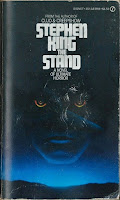
As with It, I feel I must repeat myself here and for the same reasons:
"The Stand is two different books. Both are insanely readable, but they do not (for me) occupy the same space as gracefully as they could. One is an ultra-realistic character study of a society in breakdown and recovery, with micro/macro managed adeptly. The other is a pulp religious parable where characters receive their instructions from dreams and a developmentally-challenged man * is put under deep hypnosis to become a spy and God speaks through burning bushes and stuff like that.
I don't mind either book - I don't exactly mind their co-existing under one cover, for that matter - but I can't in good conscience say this is King's best work. The two books just don't reconcile themselves as masterfully as a truly great work should. "
* M-O-O-N: that spells in-the-parlance-of-our-times.
9.
I really look forward to reading this again someday to see if it's as tightly plotted, emotionally engaging, and cosmic-revelations-y as my memory has made it. It's dropped a little since I did the 2016 rankings, but that's not quite true: it's that a few of the next 8 selections actually rose. No dis to 11/22/63.
The Franco / Abrams adaptation started so strong and ended so poorly. Yaarg. Don't get me started.
8.
Did I really swap this with Different Seasons? Part of me is screaming at me for doing so. But aren't these novellas pretty darn perfect? I think they might be. The most underrated of them seems to be "Fair Extension," which I find personally to be a resounding success: darkly funny, or amusingly horrifying. Sure one could argue it's just a retread of certain aspects of what's coming up at spot #4, but if so, a) who cares? Not me, and b) it might even be better, pound for pound, than that one.
I have only seen 1922, which I loved, but if the reviews I've read can be trusted, how silly (like "Cell," or "Under the Dome" or so many, sadly) to adapt "Big Driver" and "A Good Marriage" and not do them right. FFS those could have been Oscar winners.
7.
Here's another unfairly overlooked one. Although truthfully I don't know anyone that's seen it and doesn't think it's great. But I think (like The Regulators) it might be seen as something derivative. Whereas it's just King doing what he does really well, and that's something to be celebrated.
The only thing that detracts from the overall greatness are the terrible attempts at Maine accents perpetrated by some of the cast. Bt that's hardly King's fault.
Oh, and I guess yeah, I'm including a teleplay in my list of books. And this one only, not any of his other original scripts for film or TV, so the added crime of inconsistency. But it's one of my favorites, so here it is.
6.
Once described as "Peyton Place meets Dracula," but how many people know Peyton Place anymore? I've seen things described as "Salem's Lot meets such-and-such" more than anything with Peyton Place anymore. How quickly things change. Speaking of: this one's a big part of my childhood. Once upon a time, the mini-series, Firestarter (and Cat's Eye, I guess) were the only King I knew. Fun to think about now. (Next came The Stand, for those of you playing along at home, and then I was hooked, apparently for life.)
When people go back to writing more traditional vampire tales, I bet someone will just rip this one off and set it on a moon colony or something and it'll kick off a new round of vampire stories/ some new horror writer's career. I hope so anyway.
5.
Another very important book to King's auto-bibliography, lots of contextual wow-ness attached to this one. Not that anyone except his immediate family and friends knew that at the time it came out. And you don't need to, either. It's just a gripping story, unfolded with great precision.
I'm glad Kathy Bates gave such an iconic performance as Nurse Annie. One of King's best villains, and I'm profoundly grateful when an actor or actress brings a role to life like that. There are a few King villains that are great both on the page and on the screen, and Bates's Annie is certainly one of them. Another?
4.
Leland Gaunt, great on the page, great on the screen. I love that the book ends with his setting up a firearms stand in the alley next to his shop. He sows the wind, and Castle Rock reaps the whirlwind.(Or did Castle Rock do both?)
Another corrosive work of satire. King's got a lot going on in this book - all his usual town-under-siege, ordinary-folks-in-extraordinary-circumstances stuff, plus Castle Rock locales - but he handles the bigger look-at-this-America stuff really well, I think.
Totally Not Going to Happen Time: A sequel with the next incarnation of Leland Gaunt, set in the future. ("Jakarta," if memory serves.) One part Blade Runner, one part Even Needful(ier) Things, and another part The Running Man. I'm telling ya! This would be freaking awesome. Someone make it happen.
3.
 |
| What a cover! |
Okay I know this will chafe some folks, but what can I say? I understand the criticisms. I even agree with some of them, if not most. But what the hell? It's one of my favorites. Its flaws are adorable to me. Its energy is infectious. It creates a wonderful little world, and it's just no-holds-barred. Likely it will take some unequivocally-kick-ass film adaptation (not necessarily 100% faithful to the book but hopefully conveying its cheery nihilism) to turn the switch in people's heads.
"Gard realized he had never experienced this sort of vomiting in his entire life. He had read about it, however. He was ejecting stuff - most of it bloody - in wads that flew like bullets. And bullets were almost what they were. He was having a seizure of projectile vomiting. This was not considered a sign of good health in medical circles."
"'Devils on every side!'" he cried out grandly. He slugged back the last of the Scotch and threw the bottle over the porch railing and into the bushes. 'Devils on every side!' he repeated, and passed out."
2.
I'm still flabbergasted that when I was doing my original King's Highway posts my computer ate this one. I had all this great stuff about Kronos and infanticide and patricide and haunted landscapes and mythologies but ah well. Some internet gremlin was well-fed that day.
Still, no one needs any review of mine to instantly grasp the novel's impact and quality. Those King fans who don't like his backyard-barbecue-y endings might take issue with the end here. It's like a mirror image of its sequel, whose last 5 pages I love and the rest of it not so much, while here the last 5 I can do without but the rest I think is fairly perfect.
And hey! Speaking of perfect:
1.
I've more or less said all I can say about why this one is my favorite. But why let that stop me from a random bullet-point list of Things I Love About This Book:
- The weather. Of the many books that King has written which rely on huge storms at the end, this one is the most atmospheric and one where the weather seems almost a character of itself throughout. There are many stretches of reading where you can feel the breeze or humidity or the air conditioning, or the electricity in the air, hear the shells moving under Big Pink with the tides, or see the clouds rolling overhead.
.
- The art show where Elizabeth points an arthritic finger at one of Edgar's paintings and the shape under the surface of the water is suddenly seen. Oh man would this be a kick-ass moment on screen.
- Wireman, Edgar, and Jack are fun folks to hang out with for a stretch. Wireman has all the usual sidekick tics, and I don't know why they don't bug me here as much as similar ones for similar characters do elsewhere. What can I say, muchacho.
- There are skeletons and harpoons and haunted ships on the horizon and toxic vines encircling abandoned roadways and leaping lawn jockeys (King's perhaps oddest manifestation of his occasional Stepin Fetchit tourette's) and dolls drowned in crumbling Southern gothic estate pools. This is such a cinematic novel.
- I love that King said okay I don't want this guy to be a writer, and it can't be about a guy in a car accident, and it can't be Maine... so: a painter, who was in a work accident, in Minnesota. But hell, it all works. And I love that we finally get to see King fully bringing this Florida landscape to life. It and "The Gingerbread Girl" are definitely the work of a man who earned the landscape over decades. Edgar's unbottling and the whole PTSD working itself out/ unraveled old-life feels raw. And redemptive, if tragic. Man endures.
"Stop now or I'll take the other one, too."
~
Thank you for reading and we hope you enjoyed your stay! See you whenever a revision of the above strikes me as either necessary or like a fun thing to do.




































